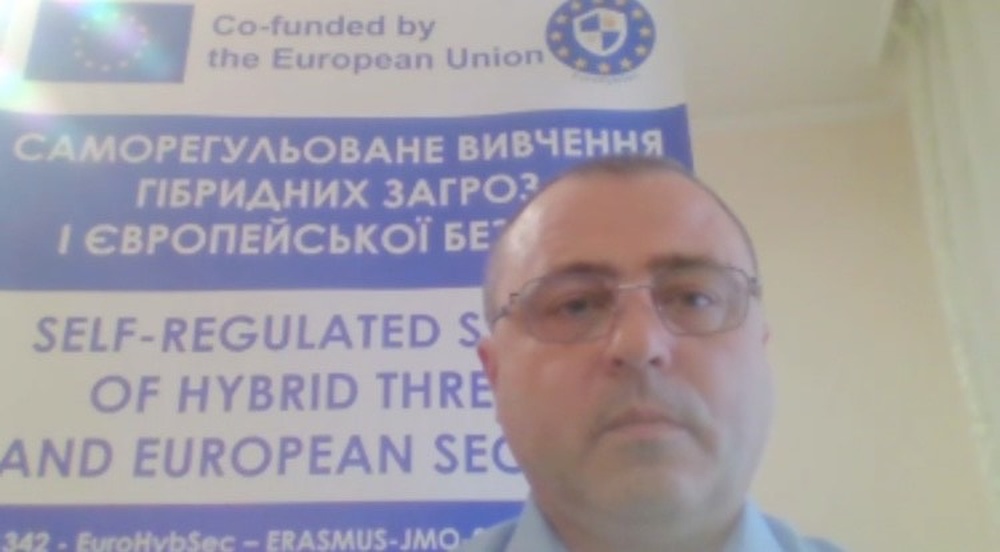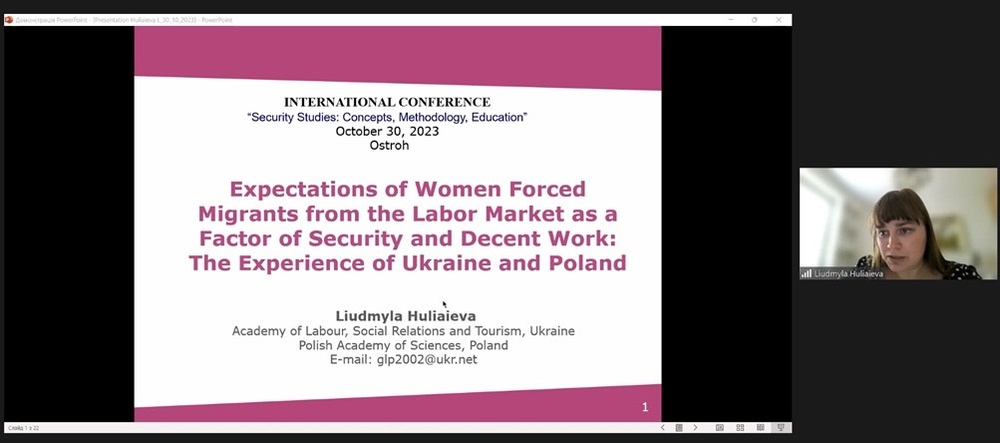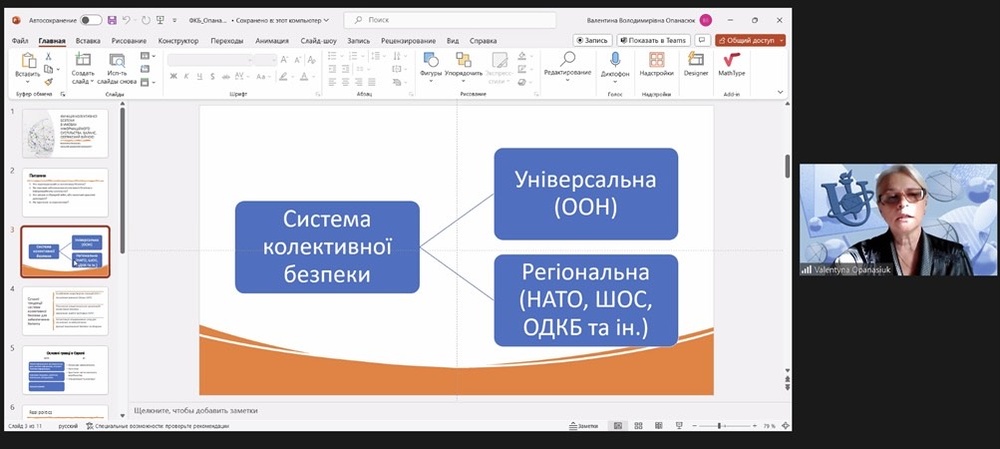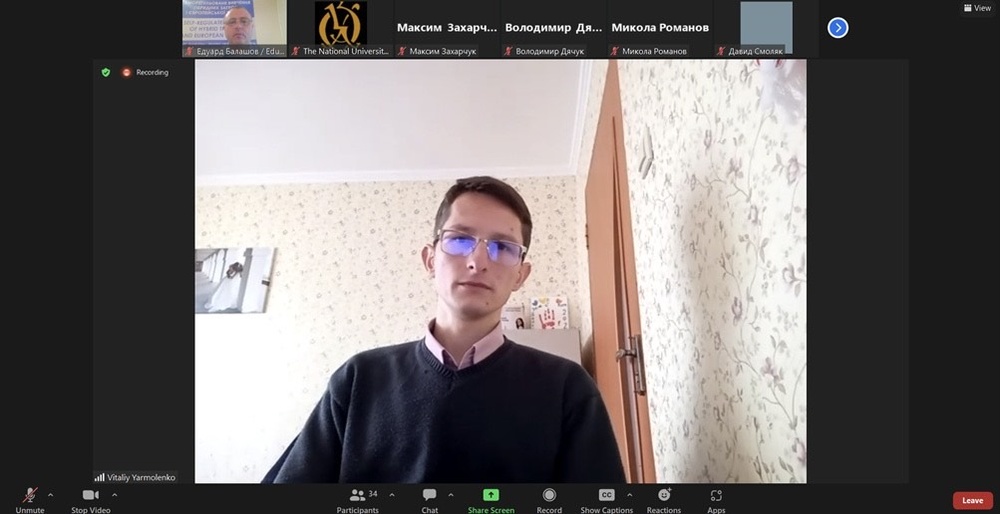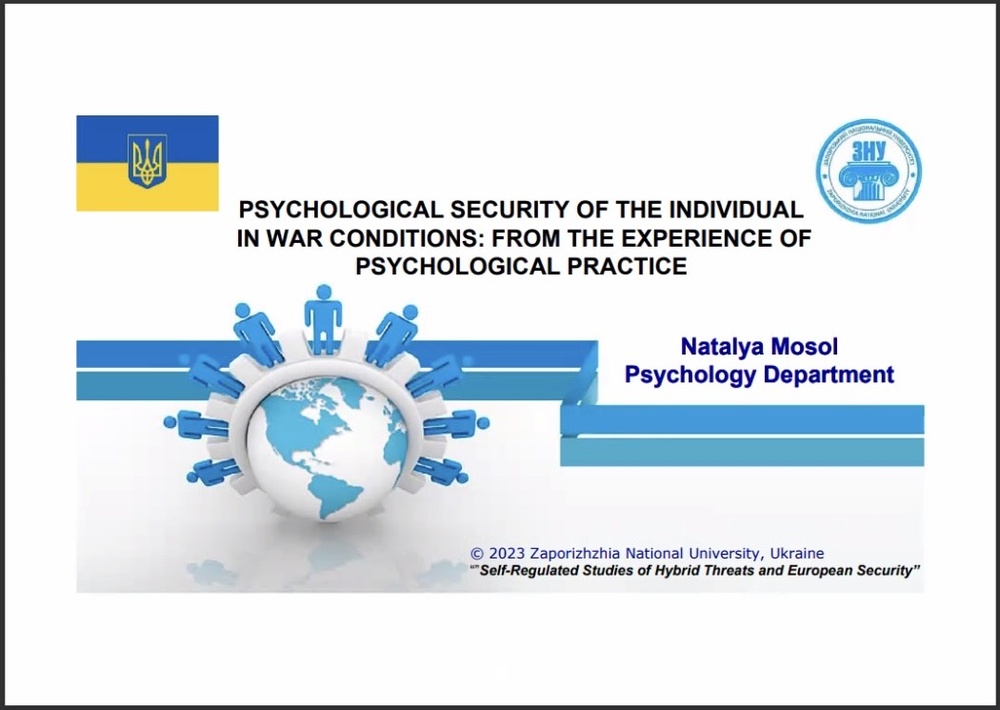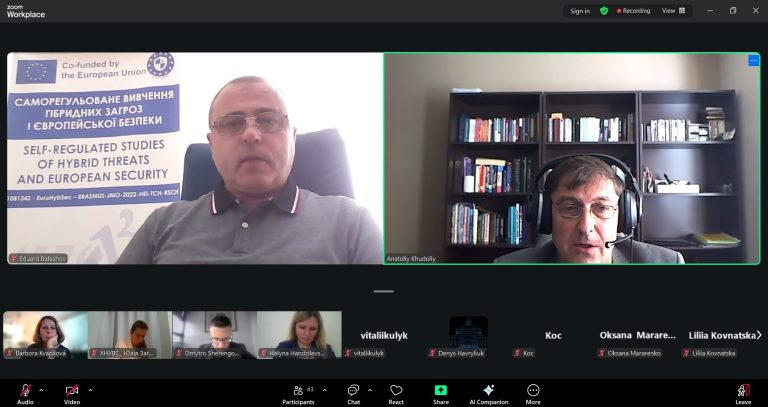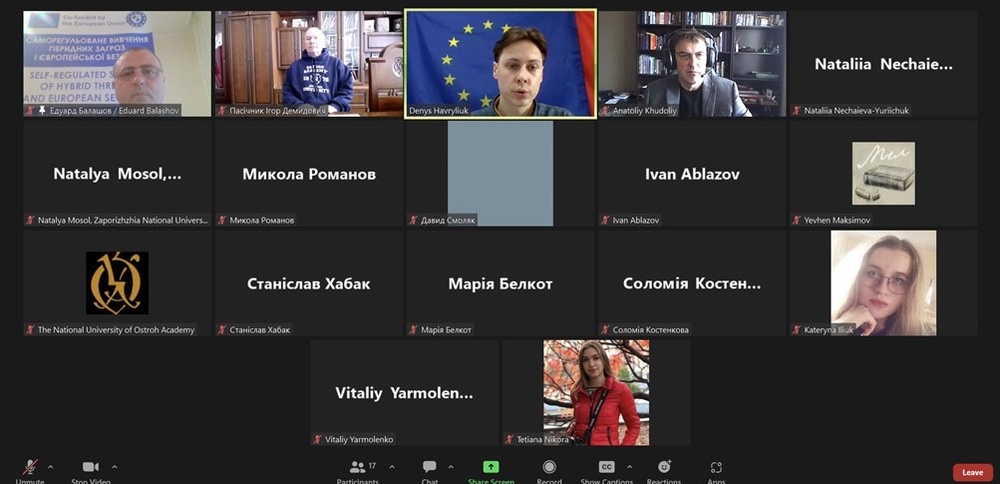
As part of Jean Monet’s project «Self-Regulated Studies of Hybrid Threats and European Security», the international conference «Security Studies: Concepts, Methodology, Education» took place at Ostroh Academy.
The workshop was moderated by Eduard Balashov, Doctor of Psychology, Professor, Rector’s Assistant for International Cooperation and Fundraising of NUOA, Manager of the Project «Self-Regulated Studies of Hybrid Threats and European Security».
«We are very glad, dear colleagues, that you are participating in our conference “Security Studies: Concepts, Methodology, Education”. Issues of national security, information security, psychological security of an individual, etc., are extremely relevant today. We are pleased to welcome all participants of the conference from Donetsk, Sumy, Kharkiv, Zaporizhzhia, Kyiv, Chernivtsi, Khmelnytskyi, Ostroh, as well as from the Federal Republic of Germany, the Republic of Poland, the Slovak Republic, and the United States of America. I am sure that today we will listen to many interesting reports related to the topic of security, and our discussions will be fruitful and informative»,
– noted Eduard Balashov.
Ihor Pasichnyk, Doctor of Psychology, Professor, Rector of Ostroh Academy, addressed the participants of the conference with an opening speech:
«Sincere greetings from the walls of the National University of Ostroh Academy. I am definitely glad that this research topic which we are working on is related to our future victory. As you know, those educational programs that are currently connected with hybrid threats are beneficial not only in scientific and intellectual circles, but also form an appropriate outlook, patriotism and attitude to what is happening. I believe that the effectiveness of this conference will be quite great. I wish you success, usuful and fruitful insights, as well as inspiration, peace and victory».
Among the speakers of the first day of the conference:
- Ben Hodges, Lieutenant General (Ret.), Commander of the US Ground Forces in Europe in 2014-2017, Chief Consultant «Human Rights First» (USA/Germany), topic: «Issues and Challenges to Global Security»;
- Anatoliy Khudoliy, National University of Ostroh Academy (Ukraine), topic: «Security Challenges to the European Region»;
- Natalya Mosol, Zaporizhzhia State University (Ukraine), topic: «Psychological security of the individual in war conditions: from the experience of psychological practice»;
- Liudmyla Huliaieva, Fellow at the Polish Academy of Sciences (Poland), topic: «Expectations of Women Forced Migrants from the Labor Market as a Factor of Security and Decent Work: The Experience of Ukraine and Poland»;
- Valentyna Opanasiuk, Sumy State University (Ukraine), topic: «The function of collective security in the information society: a balance burdened by war»;
- Nataliia Nechaieva-Yuriichuk, Yurii Fedkovych Chernivtsi National University (Ukraine), topic: «Education as a tool for overcoming geopolitical stereotypes: case «security»»;
- Yurii Yelenich, Department of Military Policy and Strategic Planning of the Ministry of Defence of Ukraine (Ukraine), topic: «The role of Great Britain in preparing Ukraine to repel a large-scale invasion on February 24, 2022 by Russia»;
- Oleksandr Marusiak, Donetsk State University of Internal Affairs (Ukraine), topic: «Ecclesiastic Warfare: Instrumentalization of the Russian Orthodox Church against Ukraine»;
- Vita Lisova, Department of interaction with the mass media and the public of the Office of the Head of the Security Service of Ukraine (Ukraine), topic: «Signs and forms of publicity of the Soviet state security bodies during the period of Gorbachev’s perestroika (1985-1991)»;
- Vitalii Yarmolenko, National Institute of Strategic Research (Ukraine), topic: ««Realpolitik» in relations between Turkey and Russia in the context of national security»;
- Kateryna Iliuk, Jagiellonial University in Krakow (Poland), topic: «Broad security agenda»;
- Mariia Belkot, National University of Ostroh Academy (Ukraine), topic: «Finnish perception of threats to national security»;
- Jakub Witczak, University of Warsaw (Poland), topic: «NATO’s strategic challenges after Russian invasion of Ukraine»;
- Tetiana Nikora, V. N. Karazin Kharkiv National University (Ukraine), topic: ««Three Seas» in strengthening the security environment of Central-Eastern Europe».
Among the speakers of the second day of the conference:
- Nataliia Konopka, National University of Ostroh Academy (Ukraine) topic: «The concept «resistance» in the sphere of national security»;
- Vadym Zheltovskyi, Warszw University (Poland), Topic: «Security Issues in the Political Agenda of European Commission»;
- Ivan Ablazov, Y. Berezniak Military Academy (Ukraine), topic: «Transformation of diplomatic strategic communications of Ukraine since February 2022»;
- Olena Pavlova, Y. Berezniak Military Academy (Ukraine), topic: «Methodological principles of the concept of «Social potential» of the state»;
- Elena Diechová, University of Zylina (Slovak Republic), topic: «Prevention of cyberbullying in the Slovak Republic»;
- Davyd Smoliak, Y. Berezniak Military Academy (Ukraine), topic: «Application of artificial intelligence and aspects of its use»;
- Mykola Romanov, National University of Ostroh Academy (Ukraine), topic: «The counterintelligence regime in Ukraine during the martial law period»;
- Bohdan Holianych, Y. Berezniak Military Academy (Ukraine), topic: «Formation of China’s political ideology at the current stage»;
- Eduard Balashov, National University of Ostroh Academy (Ukraine), topic: «Self-regulation in the study of the phenomenon of security»;
- Roman Voitenkov, Y. Berezniak Military Academy (Ukraine), topic: «Effectiveness of artificial intelligence in detecting and preventing hybrid threats in the field of information security»;
During the conference, the participants – postgraduate students, scholars, researchers, practitioners and researchers – were able to discuss various aspects, contexts and problems of European and Ukrainian security studies. The conference became a platform for sharing the results of research conducted by scientists from different countries.
The project of the direction Jean Monnet of Erasmus+ program «Self-Regulated Studies of Hybrid Threats and European Security» (101081342 – EuroHybSec – ERASMUS-JMO-2022-HEI-TCH-RSCН) is aimed at promoting European principles of building a strong and secure order by using new forms and methods of communication and creating a clear vision of the European security system for target audiences.


